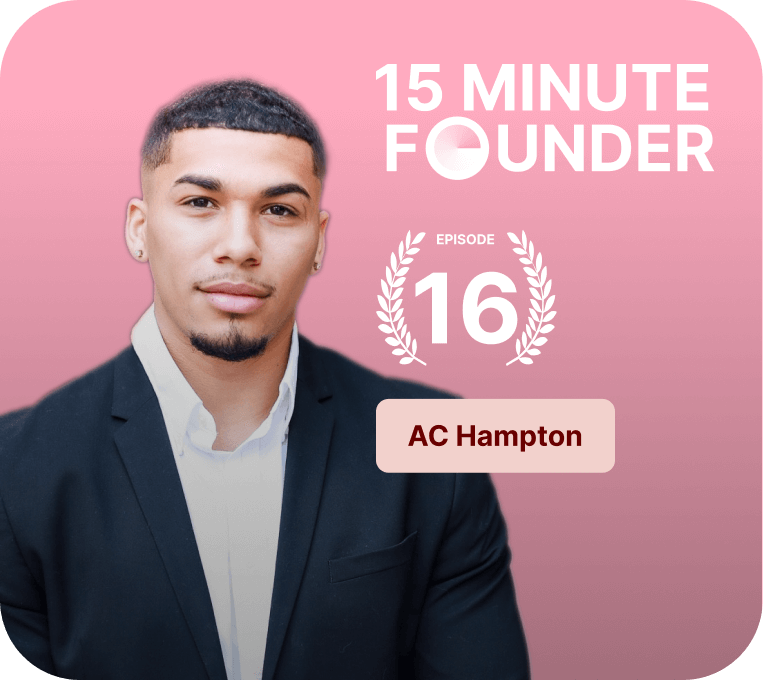Episode #11 - Maya Bakhai
#15MinuteFounder
Join us for an insightful conversation with Maya Bakhai, the founder and sole general partner at Spice Capital, an early-stage fund investing in capital, crypto, and community.
Backed by notable figures like Marc Andreessen, Chris Dixon, and Alexis Ohanian, Spice Capital has made impactful investments in companies like Dirt, Immortal Game, and Flowcarbon.
Bakhai previously led investments at Kevin Durant’s 35 Ventures, where she backed companies including Hugging Face, Mercury, OpenSea and Whoop.
Highlights
Maya, thank you so much for coming on the 15-Minute Founder. Let’s dive right in. I heard that your investing career started with an investment in Crocs. Is that true? How did that come about?
Yes, it’s true! My Twitter bio even says I’m an unofficial Crocs influencer because I’ve never been paid by them, but there’s always room for change. My journey started back when I was in college at NYU. The Robinhood team came to speak at our investment club, and I was fascinated.
I was studying finance and thought, “I can actually put my dollars to work.” The first stock I bought was Crocs—10 shares, to be exact.
Growing up in South Florida, Crocs were all the rage in the early 2000s, but my parents always bought me the off-brand ones.
Finally, in high school, I saved up and bought my first pair, even though by then, Crocs were out of style.
Fast forward to 2015-2016, Crocs started doing unique drops and collaborations, catching my interest again. When Robinhood spoke at my school, I looked at Crocs’ financials and thought it was an interesting company.
I was working for an NBA player when I noticed LeBron James wearing Crocs. That, coupled with the company’s cultural growth, made me invest heavily.
I put $20K of my savings into Crocs and was right—they had surprise earnings beats for three subsequent quarters. I used that money to start angel investing, building a portfolio of 30 companies.
That’s an amazing story! So, you used the profits from Crocs to start angel investing. Many people are curious about how to get started in angel investing. Can you take us back to your first angel investments? How do you start, and how much money do you invest?
Great question! Someone advised me to invest the same amount consistently into each company when angel investing. It’s different from building a professional fund.
When you’re starting out, you don’t have the pattern recognition, and there’s a tendency to vary your investment based on perceived signals like the founder’s background.
Instead, I started by putting $10K into each investment. I did break my own rule a few times, going up to $25K when I felt particularly bullish, but that often didn’t pan out.
Angel investing isn’t easily accessible—it depends a lot on your network. You need to be in the right circles to get access to the best founders. For example, our first fund had a $1,000 minimum to make it accessible.
I encouraged people, especially women, to learn from my investor updates and follow the companies’ progress. Platforms like AngelList now allow for smaller checks, making it more accessible.
You mentioned transitioning from angel investments to starting a fund. How did that evolution happen, and how did you come up with the name ‘Spice Capital’?
The transition to starting a fund came from noticing a gap in the market. Venture has become a large asset class, and there’s a lot of interest in tech because the biggest companies in the S&P 500 are tech companies. However, I noticed a lot of groupthink among investors who were all consuming the same information.
I kept finding brilliant founders with unique insights who weren’t getting funded because they didn’t fit the mold.
As for the name ‘Spice Capital,’ it reflects my personality—taking something and making it exciting and fun. Plus, the spice trade was a precursor to modern capitalism. And to be honest, I needed a name quickly for an investment and went with ‘Spice,’ which ended up working out well.
From angel investments to a fund, what’s the vision for Spice Capital?
Spice Capital is all about finding those overlooked opportunities and helping founders become part of the Zeitgeist. Our first investor was a founder I backed early on, and we’ve been fortunate to have amazing LPs like Mark Andreessen and Chris Dixon. We’re focused on early-stage investments, believing in a founder’s vision, and imagining future markets that don’t exist yet.
What are some hot takes or things you believe founders and investors get wrong?
For founders, building for investors rather than customers is a big mistake. Founders need a strong ‘why’ to keep them going during tough times. For investors, many treat venture as a sales game rather than one of taste. They rely too much on external validation and don’t give founders the respect and attention they deserve.
Listening and understanding insights from founders is crucial.
What’s your personal motivation at this stage of your life—money, power, pleasure, or fame?
I’d say it’s a combination of fame and power. I grew up in the performing arts, wanted to be a pop star, and always supported my creative friends early on. I’m driven by being a champion for others and discovering talent early.
Reflecting on your upbringing, what’s the most important lesson you learned from your parents?
My parents always encouraged me to be different. They taught me to be creative, to find my own way, and to impress people with hard work and curiosity. That mindset has been crucial in my career.
With such a busy life, what does a typical day look like for you?
I wake up around 6 or 7 a.m., have my coffee black, and do some form of exercise for about 30 minutes.
My day involves prioritizing various stakeholders—fund investors, current founders, future founders, and future investors. I don’t have meetings on Mondays and use Fridays to catch up on work because it’s quieter.
Finally, what’s your advice for aspiring founders at the early stage?
You have to be your own best advocate and convince yourself before you can convince others.
Test your ideas, gather data, and ensure there’s demand. Focus on building for your customers, not investors, and remember that taking venture money means you’re in it for the long haul.
Time stamps
00:11 Investing in Crocs
04:25 Angel Investing
07:48 Starting a Fund
12:55 Hot Take on Founders
17:22 Hot Take on Investors
20:58 Money, Power, Pleasure, Fame
23:02 Biggest Lesson Growing Up
25:39 A Typical Day
29:30 The Vision for Spice
32:23 Advice for Early Stage Founders
34:49 How to Get in Touch
35:18 Current Verticals
See other podcasts
Less blah,
More doola.
Join doola and start building today.





